Framework for the Digital Transformation of Government Services
30/05/23 | Blog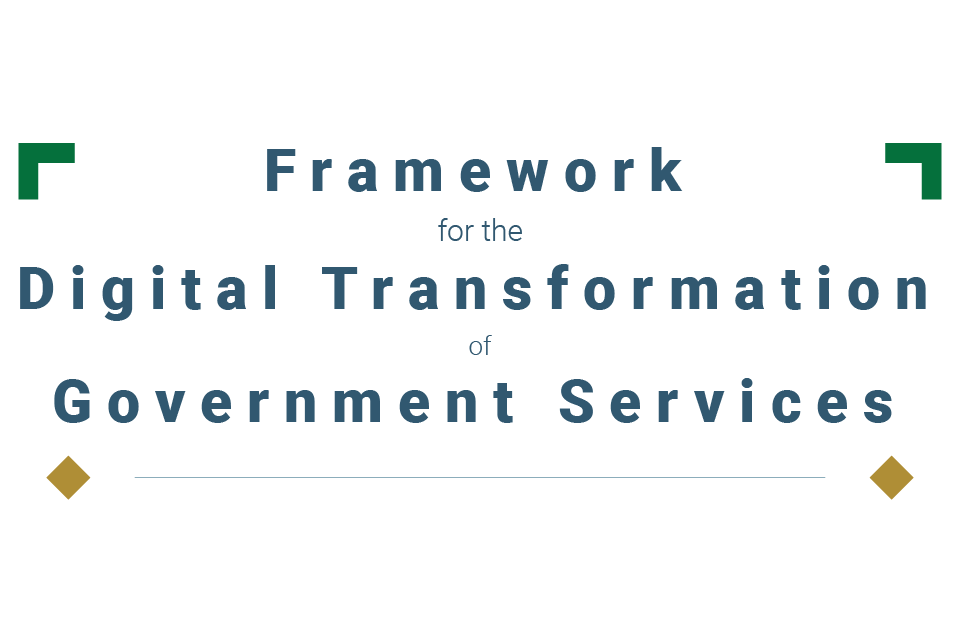
By Theodoros Demetriades, Standards Lead
It’s a wrap!
The conference our team organized on the 18th of May 2023, under the title “Framework for the Digital Transformation of Government Services”, was a success, as it brought together government representatives, tech experts, and industry leaders to unveil a framework that will revolutionise how our government serves its people.
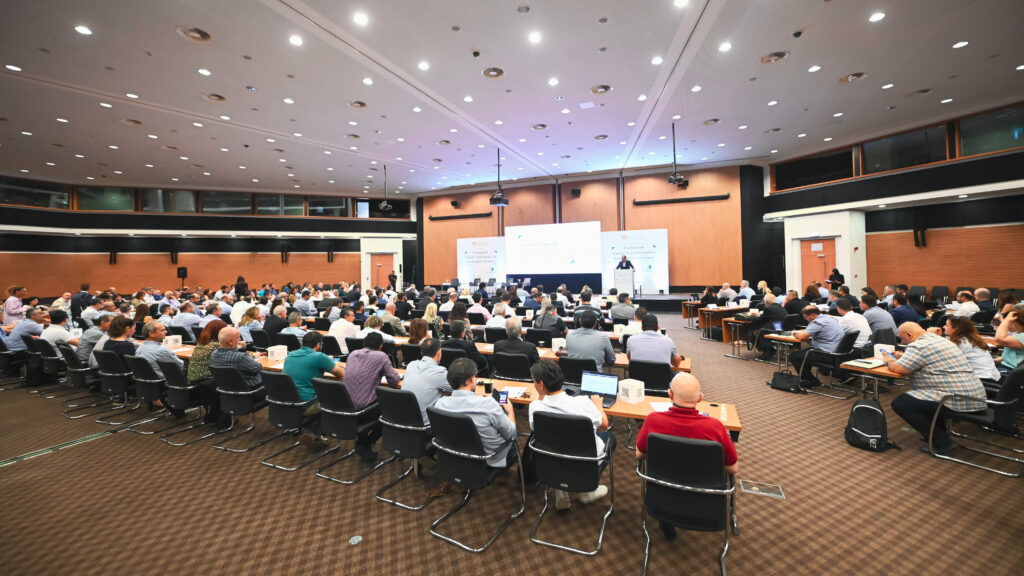
At the event, we explored exciting topics like user-centred design, user research, interaction design, content design, and technical architecture. These might sound like fancy terms, but they’re all about making our digital services easier to use, more intuitive, and tailored for the citizens. We discussed how the Service Standard will ensure that all digital services meet a high bar of quality, consistency, and user satisfaction. It’s like having a set of guidelines that keeps things in check and makes sure our services are top-notch.
This conference wasn’t just talk. We also had interactive workshops, where we shared best practices and lessons learned with industry professionals, giving us a great opportunity to showcase our application of these insights with them. We demonstrated that by embracing agile methodologies and the principles of the Service Standard, we ensure that our digital services keep getting better every step of the way.
Here’s the play-by-play of how the event went down.
The Conference on 18/5/2023
Opening statements

Dr Stelios Himonas, Permanent Secretary of the Deputy Ministry of Research, Innovation and Digital Policy, explained the goal of the Deputy Ministry to provide simple, understandable, and consistent services for citizens and businesses. In reference to the comprehensive reform plan implemented by the ministry, he spoke of the special focus placed on transforming the way services are produced and offered. Dr Himonas highlighted the collaboration with the UK’s Government Digital Service (GDS) in developing a new methodology for service development and planning the tendering process. He announced that the preparations were completed and that the next step would involve the Mini-Competitions. Dr Himonas emphasised the joint nature of the project, involving both the ministry and the private sector, and underscored the importance of following the Service Standard and implementing agile methodologies to ensure simplicity, understandability, and uniformity of services for citizens and businesses.
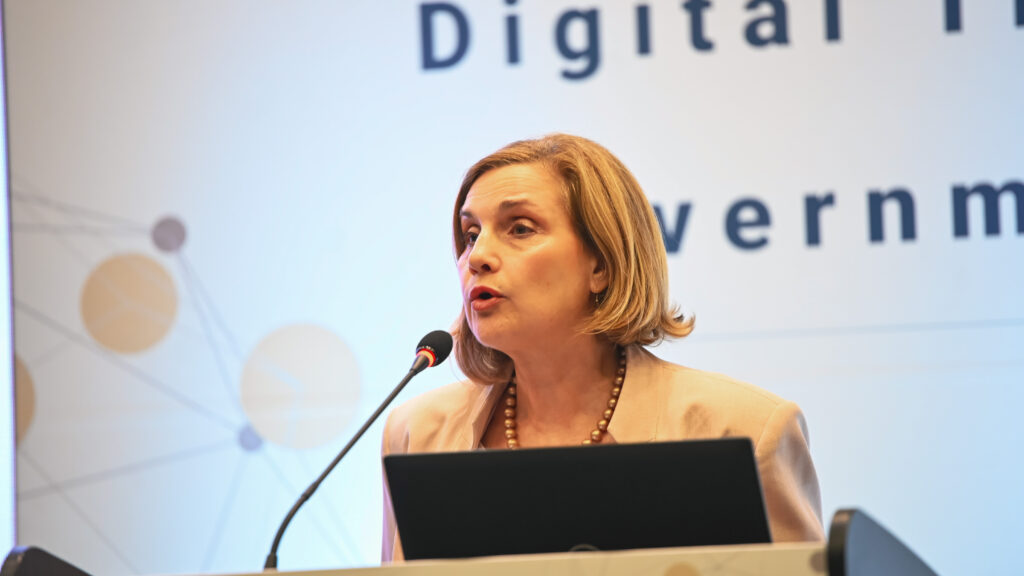
In her speech, Ms Andriana Achilleos, the Director of the Department of Information Technology Services, highlighted the key objectives of the department, which include improving services for citizens, increasing productivity in the public sector, and reducing operating costs. She emphasised the role of the Digital Services Factory (DSF) in promoting changes that cater to the needs of citizens and businesses. Ms Achilleos emphasised that the Framework establishes a new approach to collaboration between the public and private sectors, with digital services being developed using an agile methodology and in adherence to the service standard. She also mentioned the upcoming Mini-Competitions for small bundles of digital services to be hosted on the DSF infrastructure and stressed the importance of close cooperation between IT officers, various departments, and contractors.
The Digital Services Factory
Chariclia Olymbiou, our Product Manager, shared the vision and approach of our team in driving the digital transformation of government services in Cyprus. In her presentation, she said that by placing a strong emphasis on user-centred design, agile methodology, and the power of technology, we achieve our mission of delivering public services that truly cater to the needs of citizens. By working closely with the private sector and adhering to high standards set by the Service Standard, she added, we aim to design and deliver exemplary digital services.
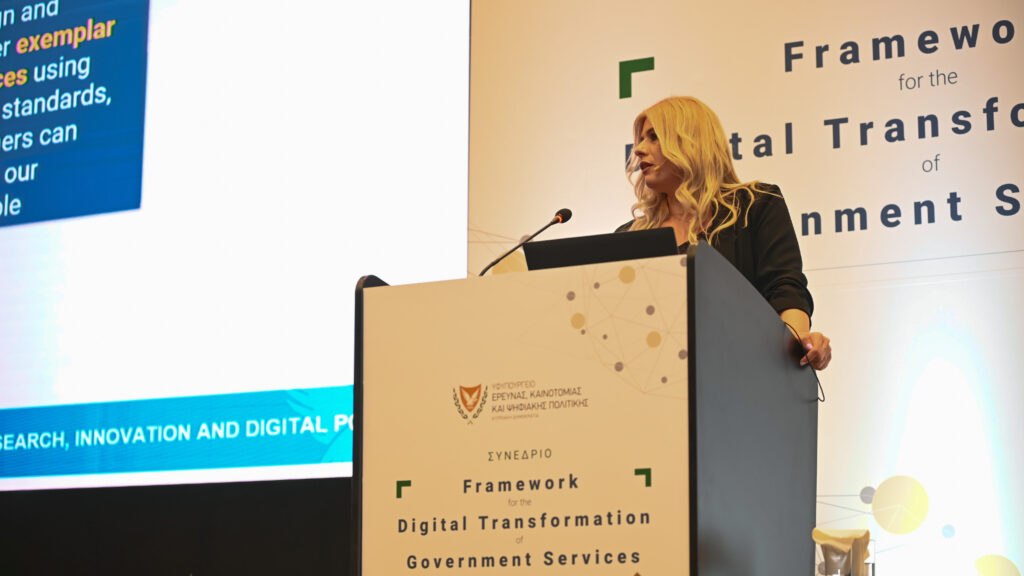
She explained that at the heart of our operations lies our multidisciplinary team, using Scrum – a flexible and effective agile methodology. This methodology, she said, allows us to prioritize tasks, develop comprehensive plans, and execute them efficiently, ensuring we meet our goals effectively. We are committed to collaboration, adaptability, and continuous improvement, she added, all aimed at shaping a future where government services are simple, user-friendly, and accessible to everyone. Chariclia invited citizens, stakeholders, the private sector, and fellow government agencies to join us on this transformative journey and work together to this end.
Together, she concluded, we can make a significant impact and create a digital landscape where government services truly serve the needs of our community.
The Framework and Mini-Competition workstreams
Evelyn Michaelidou, our Mini-Competition coordinator, was up next to provide a comprehensive overview of the Framework Agreement and the Mini-Competitions, marking a significant milestone in our digital transformation journey. She explained how this Framework represents a new approach to collaboration between the public and private sectors in delivering digital services. Our goal, she said, is to create a flexible digital marketplace that works closely with a diverse group of service providers, enabling them to respond quickly and effectively to various service development needs.
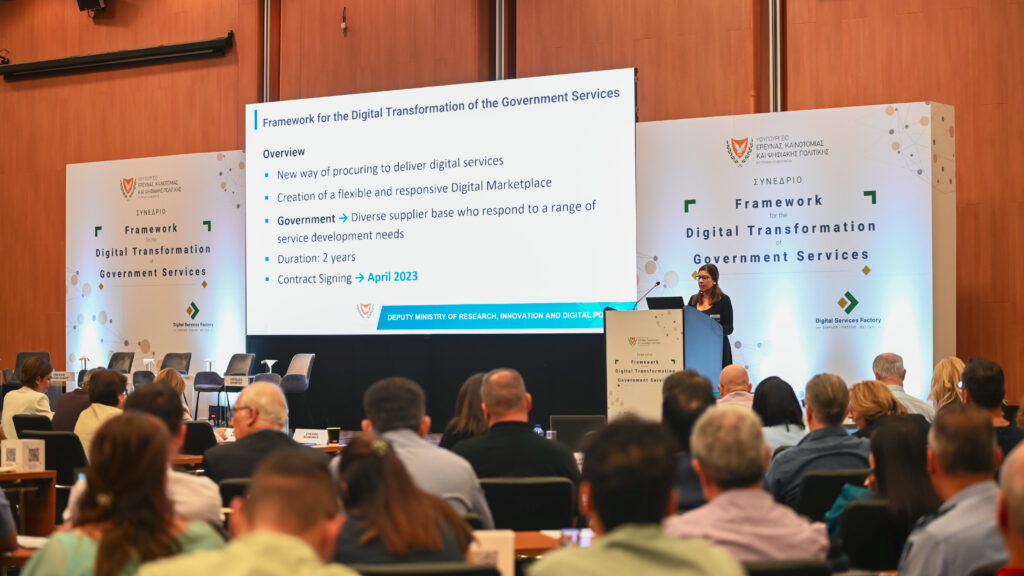
In her presentations, Evelyn explained that the Framework consists of two main lots. LOT 1 includes 31 service providers who can form service teams and deliver services, while LOT 2 comprises five specialised providers who focus on participant recruitment and offer research studio facilities for user research. The Department of Information Technology Services serves as the Coordinating Contracting Authority, overseeing the two-year duration of the Framework. The Digital Services Factory Team is in charge of managing and coordinating the Framework and the subsequent Mini-Competitions.
This Framework revolutionises government services by prioritising citizen-centric experiences and leveraging the expertise of service teams and user research studios, she said, with the aim to create a more streamlined and responsive digital ecosystem that caters to the diverse needs of the public. Together, she concluded, we are embarking on a transformative journey towards a future where government services are more accessible, efficient, and tailored to the ever-evolving demands of our society.
DSF Service Standard and government building blocks
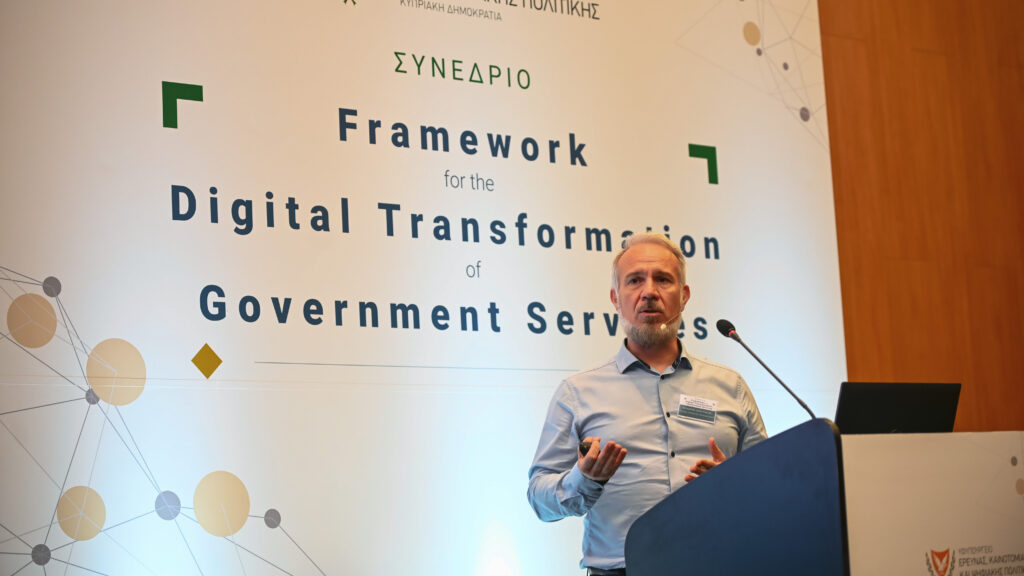
Theodoros Demetriades, our Standards lead, emphasised the important role of the Service Standard in enhancing government services in Cyprus. His presentation provided a comprehensive overview of each section of the Service Standard, complemented by examples showcasing how these standards are put into practice. Attendees were given a step-by-step tour of the DSF website, learning their way around the Service Standard, as well as the relevant guidelines and accompanying documentation. The importance of following the standard was emphasised, as it plays a key role in improving government services by ensuring consistency, quality, and a user-centric approach. Furthermore, the Assurance process was introduced, underscoring its significance in verifying that services align with the Service Standard.
The online Workshops 22-23/5/2023
Over 120 IT professionals attended each workshop, demonstrating a strong interest and engagement within the IT community on the topic of digital transformation in government services.
User-Centred Design (UCD) & Service Design
Yiota Andreou, our Service Designer, launched our 2-day online workshops by exploring the significance of User-Centred Design (UCD) and Service Design in revolutionising government services. She explained that UCD methodology places users at the heart of the design process, facilitating the creation of intuitive and user-friendly digital solutions. It was highlighted that by conducting user research, usability testing, and iterative design cycles, we can develop services that cater to the diverse needs and expectations of citizens.
Integrating UCD with agile methodologies was discussed in detail, showing the benefits of continuous user feedback and iterative improvements. This combination was demonstrated to allow for rapid prototyping, testing and refinements, ensuring that government services can adapt to changing user needs. Yiota’s presentation expanded on how design thinking emerged as a human-centred approach, encouraging empathy, ideation, prototyping, and testing to address complex challenges effectively. By embracing design thinking, she explained, we can foster cross-functional collaboration and develop innovative solutions that enhance the overall user experience.
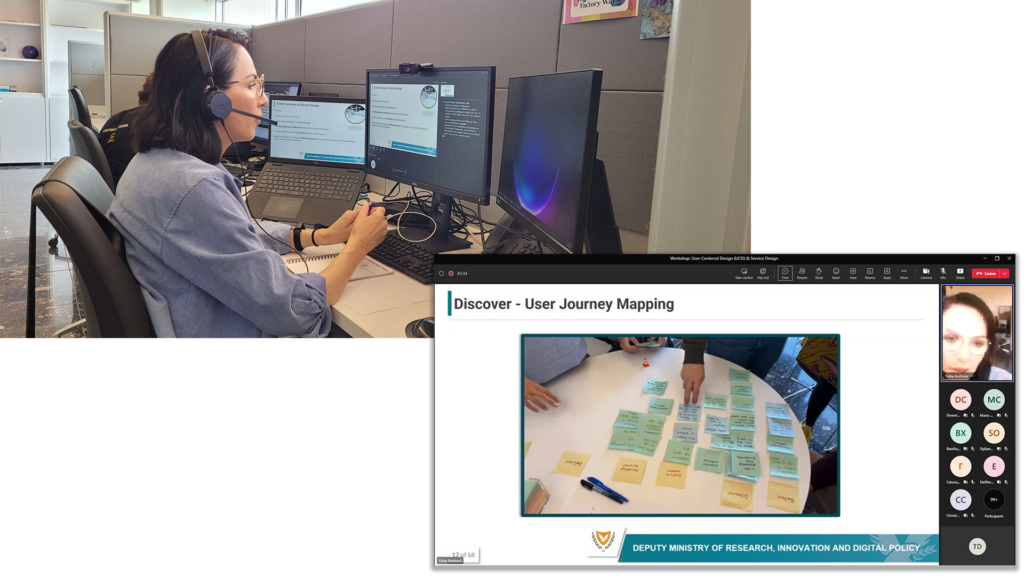
Yiota said that aligning UCD with the Service Standard proved crucial in promoting a user-centric culture within governments and that by incorporating UCD principles into the Service Standard, governments can create services that are accessible, inclusive, and tailored to diverse citizen needs. This alignment fosters trust and improves the overall user experience, ultimately enhancing the delivery of government services, she added.
Relevant guidelines and documentation for the Workshop
Content Design
Content design was emphasised as a decisive element in delivering clear and user-focused information. Elpida Hadjivasiliou, our Content Designer, explained how, by utilising plain language, logical structuring, and intuitive presentation, we can optimise digital services to effectively communicate with citizens. Additionally, she described how drawing meaningful conclusions from user research findings enables us to refine content based on user needs and preferences. During the workshop, special emphasis was placed on the importance of designing clear and actionable error messages that guide users in resolving issues. She explained that by addressing error messages with empathy and helpful instructions, governments can enhance the user experience and instill confidence in their services, while ensuring increased submissions and user satisfaction.
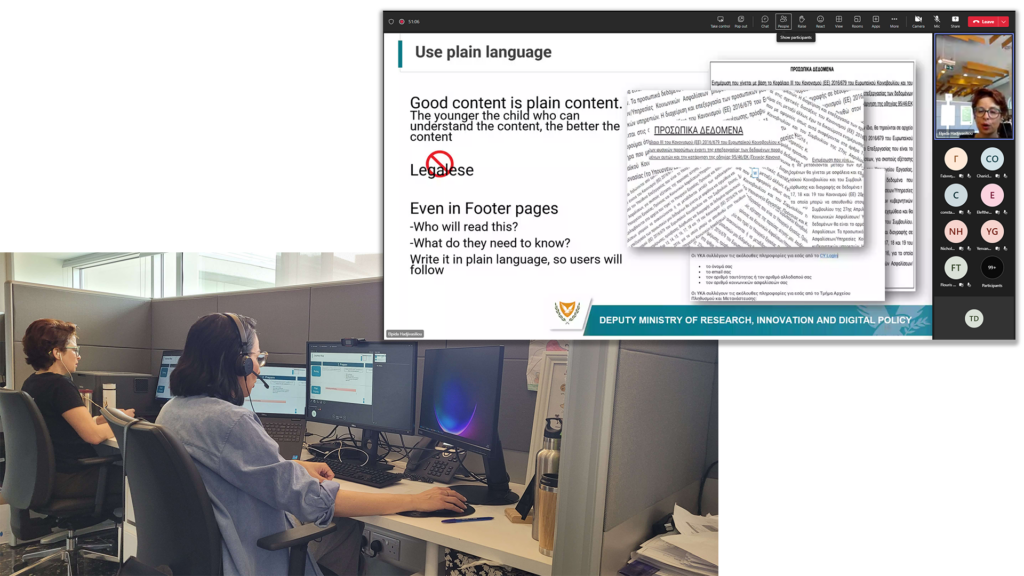
Choosing appropriate names for government services was discussed as an essential aspect of content design. With user research and brainstorming within the UCD team, service names are clear, descriptive, and resonate with citizens’ expectations, facilitating easy access and engagement with government services.
Elpida made a point that simplifying long and complex text is another key strategy for improving user understanding and engagement. By using plain language, breaking down information, and incorporating visual elements, we can enhance accessibility, user satisfaction, and overall service usability.
By prioritising user-centric approaches, she explained, we can deliver clear, concise, and accessible information to citizens. Through content design, insights from user research, effective error handling, service naming, and simplification of complex text, we can create seamless and user-friendly digital experiences that foster citizen engagement and satisfaction in the ever-evolving digital landscape, she concluded.
Relevant guidelines and documentation for the Workshop
User Research
The third workshop of the first day focused on the important role of User Research (UR) in driving successful digital transformation. User research serves as the foundation for understanding user needs, enabling governments to deliver user-centric and effective services. Anna Alexandride, alongside Katerina Afantiti, our User Researchers, covered various aspects of UR, including qualitative research methods, user-centricity, participant selection, issue uncovering, alignment with the Service Standard and issue-solving capabilities.
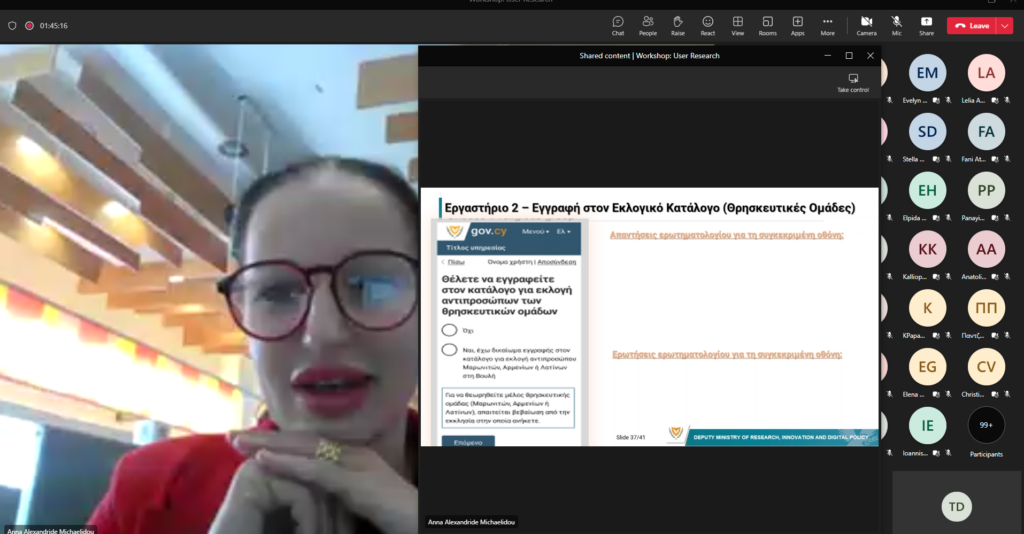
Anna explained that user research emerged as a transformative tool in government services, enabling user-centricity by deeply understanding user needs and behaviours. By employing qualitative research methods, she said, we can gather valuable data to inform design decisions and iterative improvements. She also added that targeted recruitment methods ensure that the right participants are involved, leading to accurate and representative insights. User research was demonstrated to help uncover hidden issues, risks, and pain points, facilitating proactive issue resolution and enhanced service quality.
Through her presentation, Anna demonstrated that aligning user research with the Service Standard ensures that user insights and continuous improvement are prioritised, and that by integrating user research practices, we can cultivate a user-centric culture and deliver high-quality services that meet diverse user expectations. Moreover, she underlined, user research serves as a powerful tool for issue-solving, enabling evidence-based decision-making and optimised government services.
User research, she added, plays a pivotal role in digital transformation and the optimization of government services. By leveraging user insights, she said, we can deliver user-centric, accessible, and effective services that address citizens’ needs. She explained that user research serves as a catalyst for evidence-based decision-making, issue resolution, and continuous improvement in the pursuit of digital excellence in government service delivery.
Relevant guidelines and documentation for the Workshop
Interaction Design
The first day of our workshops concluded with Interaction Design and its importance in creating an accessible, intuitive and engaging user experience throughout gov.cy. Constantinos Evangelou and Akis Chimaris, our Interaction Designers, focused on designing user interactions with digital interfaces, ensuring usability, accessibility, and visual coherence. The workshop covered principles, standards, the power of the Design System and its products, collaboration with front-end developers, alignment with the Design System, the use of Figma for rapid design and prototyping, and the future of Interaction Design in government services.
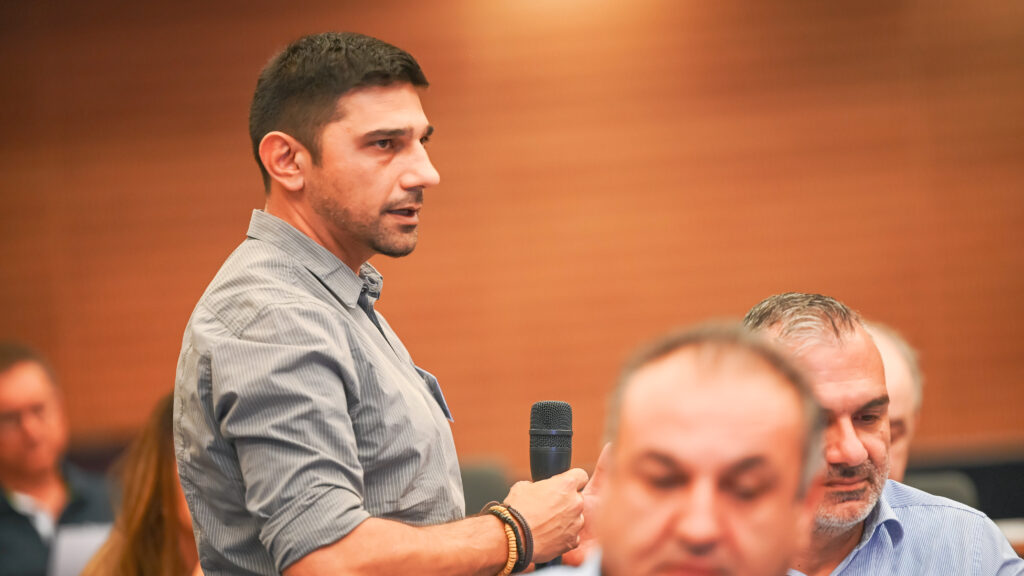
Constantinos highlighted the way Interaction Designers play a vital role in creating meaningful user experiences. By understanding user needs and applying design principles, he said, they design intuitive interfaces that guide users through seamless interactions.
During the workshop, emphasis was placed on the Design System and the lessons learned from its implementation by various teams.
The workshop also demonstrated how the Design System serves as a single point of truth for Interaction Design, providing a centralised repository of design elements and guidelines. Adhering to the Design System standards through this process ensures consistency and user-friendliness across gov.cy digital services and builds user familiarity and trust.
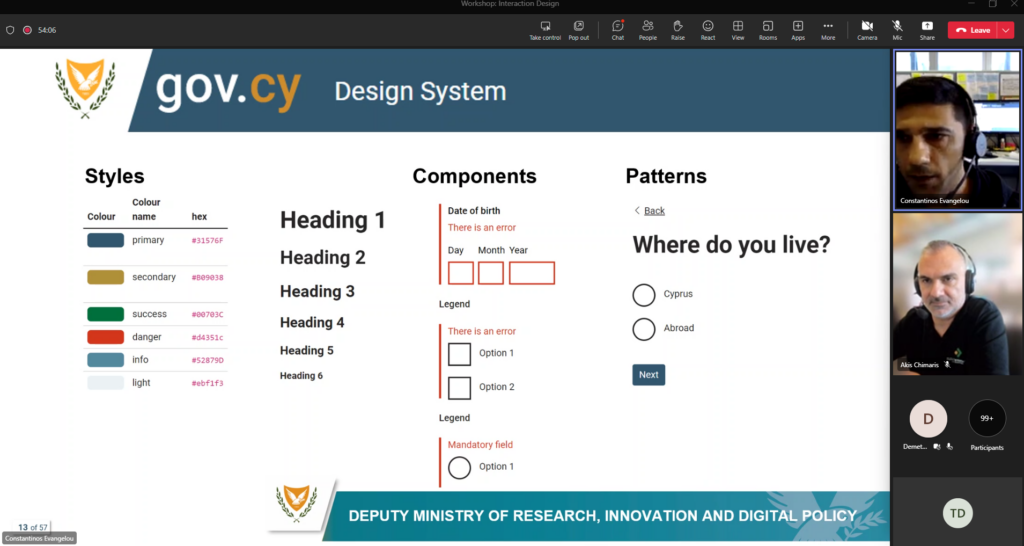
The workshop highlighted that service delivery teams may also benefit from using the Design System’s products, as they are built to be reused and reduce the service design, prototyping and front-end development cost. The Design System was also shown to enhance design decision-making, eliminating the need for unnecessary arguments about design. Additionally, it was explained that its libraries also provide a common design language that can form a basis for better collaboration between team members and other teams.
The Design System products are also designed to be easy to use and reduce the time from conception to creation, facilitating efficient iterations and feedback gathering. This was showcased during the workshop with a demonstration by Akis, where we created a new design and prototype for a sample service using our Figma Library in just 10 minutes.
Looking ahead, the workshop explained that Interaction Design will continue to evolve with even more design elements and tools to help teams deliver impactful and user-centric government services.
Relevant guidelines and documentation for the Workshop
Architecture and Infrastructure
The second day of our workshops started with George Papacharalambous, our Technical Architect, who shed light on the role of DSF infrastructure in driving innovation and building robust government services. In his workshop, he covered significant aspects, including the DSF Cloud Policy, technical standards supporting open source and cloud, the onboarding process, the service journey, and aligning DSF readiness with the Service Standard.
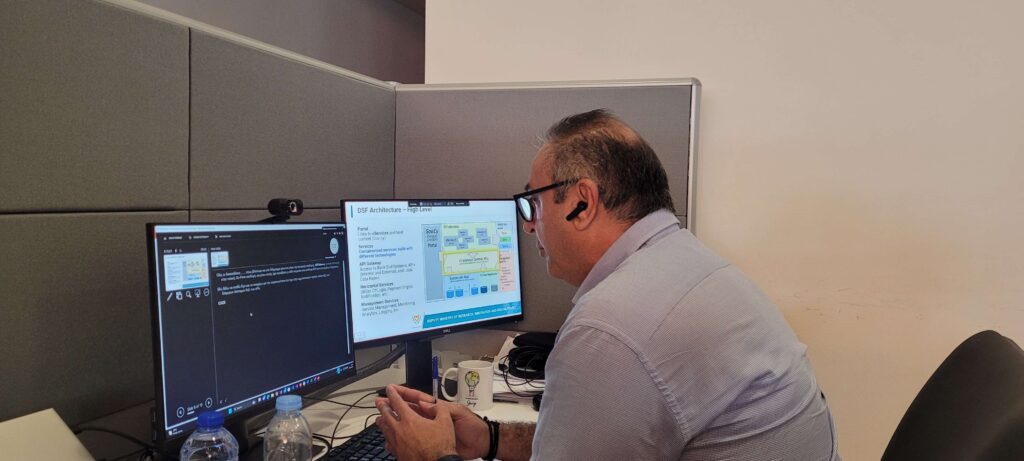
The workshop emphasised the importance of the DSF Cloud Policy, which provides guidelines for secure and scalable infrastructure using cloud computing technology. Adopting cloud infrastructure enables enhanced service delivery, scalability, and cost efficiency. Technical standards and principles supporting open-source, cloud and integration with back-end systems using the API gateway were highlighted as drivers of innovation, promoting flexibility, interoperability, and collaborative development within the DSF infrastructure.
The onboarding process was discussed as an important step to successfully integrate with the DSF infrastructure. By following the onboarding process, service delivery teams can access guidance, resources, and support for a smooth transition, ensuring standardized infrastructure and optimised operational efficiency.
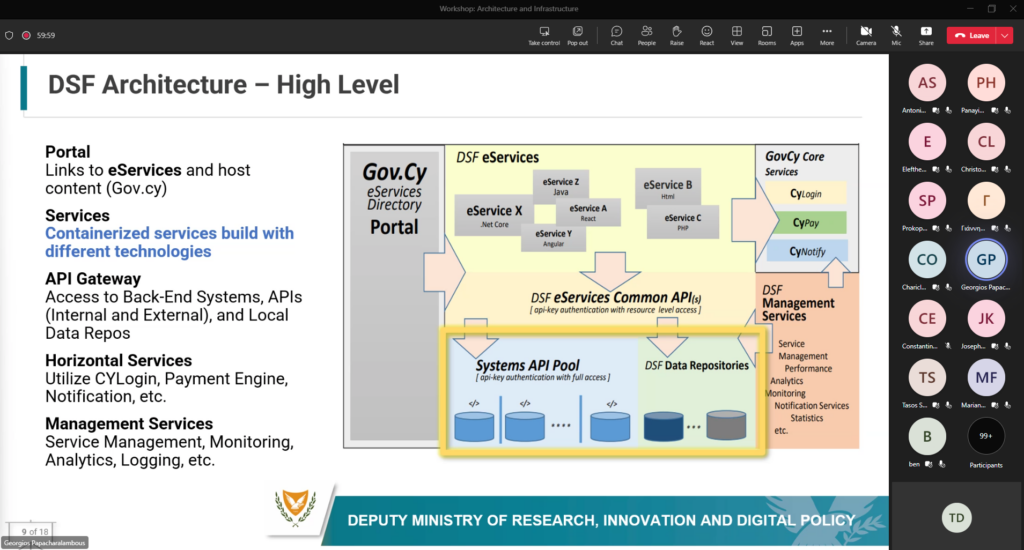
The service journey when building services using DSF infrastructure was explored, showing the benefits of the DSF infrastructure for government services. This journey allows agencies to enhance service delivery, scalability, and agility while aligning with the Service Standard.
The Architecture and Infrastructure workshop highlighted the significance of DSF infrastructure in driving innovation and building robust government services. By following the DSF Cloud Policy, embracing open source and cloud technologies, following the onboarding process, and aligning with the Service Standard, service delivery teams can take advantage of the potential of DSF infrastructure to deliver efficient, scalable, and user-centric digital services.
Relevant guidelines and documentation for the Workshop
Service Development
The Service Development workshop emphasised the significance of DSF in enabling efficient and user-centric service development. Our developer, Nicolas Rialas, covered essential aspects such as the DSF service development process, using GitHub for open-source code collaboration, and utilising horizontal mechanisms like CY Login, CY Notify and APIs in service development.
The workshop highlighted the DSF service development process using the Design System, which follows a user-centric approach ensuring services are intuitive, accessible, and efficient. GitHub was presented as a powerful tool for open-source code collaboration, enabling developers to work together, share knowledge, and drive innovation in service development.

Horizontal mechanisms, specifically CY Login, were mentioned as crucial components in service development. CY Login provides a centralized authentication system, simplifying the user experience and enhancing data security by eliminating the need for multiple logins.
APIs were emphasised as key enablers for seamless integration and efficient data exchange between systems and services. By leveraging APIs, government agencies can create connected and interoperable services, improving the user experience and promoting data sharing.
Relevant guidelines and documentation for the Workshop
Testing Process
In the Testing Process workshop, Stella Agrotou Demetriadi, our Test lead, highlighted how testing can achieve service excellence. The workshop covered key aspects such as the importance of testing, quality optimisation through Agile testing methodologies, testing across the service lifecycle, characteristics of different testing levels, and the DSF team’s journey towards service excellence.

Testing was emphasised as a vital component in ensuring the reliability, functionality, and security of government services. By investing in comprehensive testing strategies, Stella said, we can identify and rectify defects, enhance user experience, and maintain service integrity.
The workshop explored the integration of Agile methodologies into the testing process. Agile testing enables iterative and collaborative approaches, allowing for continuous improvement and adaptability to changing requirements. By embracing Agile testing, it demonstrated, we can optimise quality, responsiveness, and overall service delivery. Stella added that by incorporating testing at each stage throughout the service lifecycle, from development to maintenance, we can proactively identify and address issues, ensuring a smooth and error-free service experience.
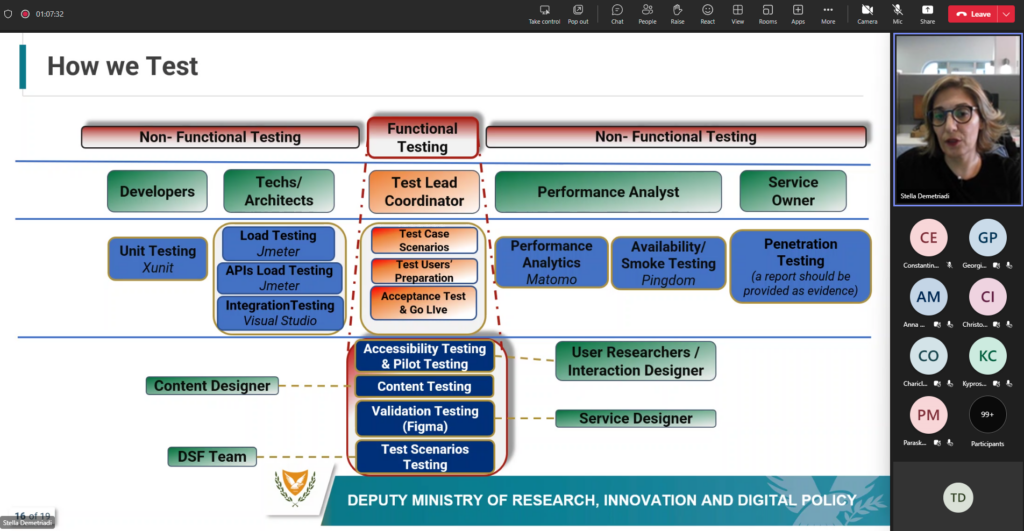
Different testing levels, including unit testing, integration testing, system testing and user acceptance testing were discussed. Understanding the unique characteristics of each level enables the team to design effective testing strategies tailored to their specific service requirements.
By recognizing the importance of testing, adopting Agile methodologies, implementing testing throughout the service lifecycle, understanding different testing levels, and learning from the DSF team’s journey, the workshop highlighted how we can ensure the delivery of exceptional and reliable services to citizens. Testing, Stella concluded, plays a pivotal role in the digital transformation of government services, enhancing user satisfaction, and building trust in the government’s ability to deliver reliable and efficient solutions.
Relevant guidelines and documentation for the Workshop
Performance Framework (KPIs)
The Performance Framework workshop closed our 1 plus 2 days conference on “Framework for the Digital Transformation of Government Services”. Nicoletta Hadjiyianni, our Performance lead, emphasised the significance of Key Performance Indicators (KPIs) in measuring and improving service performance. The workshop covered the journey of collecting and utilising KPIs, practical examples of KPIs for services like the Child Birth Grant and Voter’s Registration, GDPR compliance, and aligning KPI implementation with the Service Standard.
KPIs were highlighted as powerful tools for evaluating service success. By establishing meaningful metrics and implementing data collection mechanisms, the workshop demonstrated how we can measure their performance, identify areas for improvement, and make informed decisions. The workshop provided practical examples of KPIs tailored to specific services, showcasing how KPIs can measure efficiency and user satisfaction.

GDPR compliance was emphasised in the workshop, stressing the importance of protecting user privacy and maintaining data security when collecting and utilising KPIs. The workshop also underlined how government agencies must ensure that their data collection and analysis processes align with GDPR regulations and guidelines.
Aligning KPI implementation with the Service Standard was also highlighted. By integrating KPIs into the service development and evaluation process, we can ensure that the performance metrics align with the user-centric principles and requirements outlined in the Service Standard. This alignment promotes accountability, transparency, and continuous improvement.
Relevant guidelines and documentation for the Workshop
The conference on “Framework for the Digital Transformation of Government Services” has been an exciting journey, filled with insightful workshops and presentations focused on various aspects of digital transformation. From user-centred design and content development to testing processes, architecture, and performance measurement, each workshop has contributed to our collective effort in revolutionising government services in Cyprus.
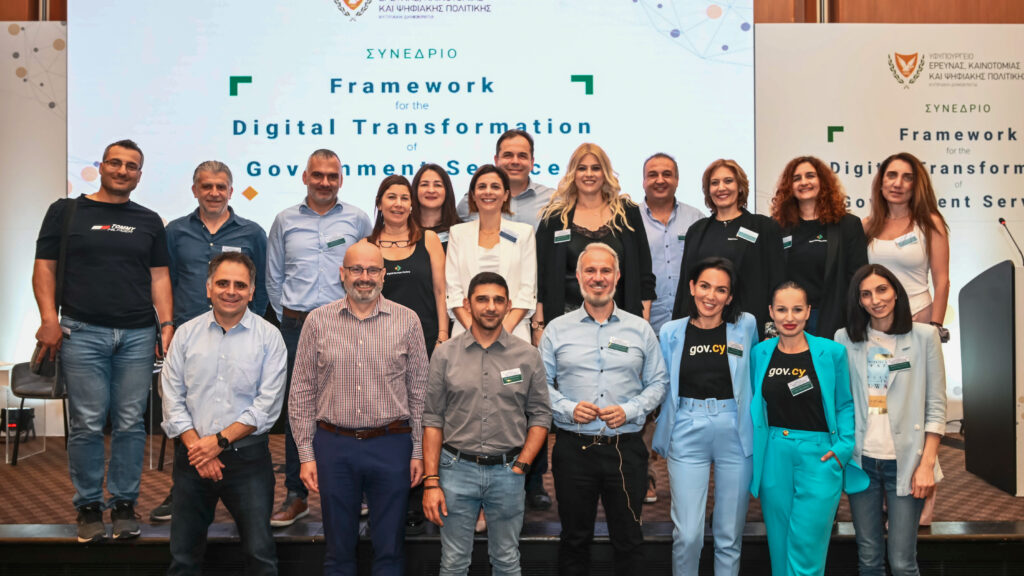
Through these workshops, we emphasised the importance of user-centricity, agility, and continuous improvement in delivering high-quality services that meet the evolving needs of citizens. We explored frameworks, methodologies, and practical examples that empower government agencies and service teams to embrace digital innovation, take advantage of open-source collaboration, and ensure compliance with standards and regulations.
Moving forward, the DSF team remains dedicated to the digital transformation of government services in Cyprus. We will continue to embrace best practices, harness emerging technologies, and foster collaboration to build a future where citizens can access seamless, user-friendly and efficient digital services. Our journey towards digital transformation is ongoing, and we invite all stakeholders to join us in shaping the future of government services, fueled by innovation, transparency, and a commitment to improving the lives of citizens.
Relevant Content
- How User Research drives success in digital Government services
- Enhancing the Unified Design System with automated visual testing
- Design System update (V.3.0.0) - Unified Design System
- Improving Accessibility: Lessons from making design elements screen reader-friendly
- How to use the Figma community library file to design digital services